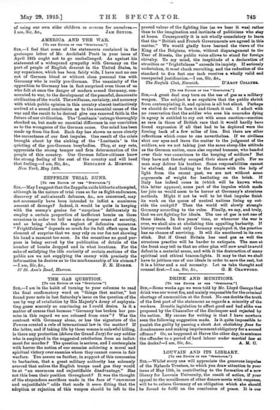[To ram Rama or an "ersrraros."1
Sze.,—A great deal may turn on the use of gas as a military weapon. The subject is so repulsive that the publio shrink from contemplating it, and opinion is all but silent, Perhaps we should do well to face it and thrash it out. I admit with no reservation that the soldier who sees his comrades dying hi agony is entitled to cry out with some emotion—emotion so rare in those of British race that it would hardly have found expression if all that had to be deplored were the forcing back of a few miles of line. But there are other reflections which come to one nevertheless. If we civilians shut our eyes and leave the matter to the judgment of the soldiers, are we not taking just the same sheep-like attitude as the German nation, once also reputed humane, who handed over their war-conscience to the keeping of soldiers? But they have not thereby escaped their share of guilt, For no man may deliver his brother. Some responsibilities cannot be shelved. And looking to the future with the help of light from the recent past, we are not without some arguments of weight for hesitating on the brink. If Italy baa indeed come in (which will be known when this letter appears), some part of the impulse which made her join us would seem to be horror at Germany's atrocious methods. Might it not be well to let that impulse finish its work on the queue of neutral nations lining up out- side the cockpit? Then the world will slowly strangle Germany according to the rules. Finally, we say, and truly, that we are fighting for ideals. The use of gas is not one of those ideals. In five years' time, or whenever the war is over, we shall aim at abolishing this appalling barbarity. If history records that only Germany employed it, the practise has no chance of surviving. It will die smothered in its own stink. But if Great Britain has used gam as well the atrocious practice will be harder to extirpate. The men at the front may tell us that no other plan will now avail to avoid defeat in a material sense, and with it the destruction of many spiritual and ethical beacon-lights. It may be that we shall have to jettison one of our ideals in order to save the rest, bat it is a bitter and a sad necessity. Let us take thought and


































 Previous page
Previous page